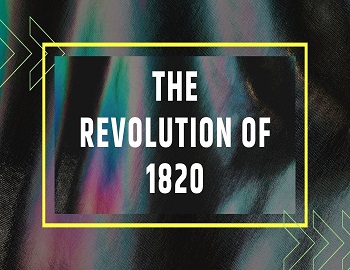Mazzini and Young Italy:
All the efforts made for the unification of Italy till 1830, were a total fiasco. Italian patriots had to succumb to defeat against Austria’s invincible strength. At such a crucial time, a great person appeared and ignited a new awakening among Italians. That glorious person was none but Mazzini. He dreamt that Italy would also achieve independence one day and it appeared as if he had experienced the revelation from the heavens that he would emancipate and lead Italy.
In his interesting and marvelous biography, Mazzini has disclosed the experiences of his student life in these words, “I had the uproar of students’ life all around but I looked always serious and contemplative among them and it seemed as if I had grown old all of a sudden. Like a child, I resolved that I would always put on black clothes because I felt myself wailing over the miserable condition of my country.” Prior to the revolution of 1830, he was a member of Carbonari. He too participated in the revolution. After the suppression of the revolution, he was arrested and sent to prison in the Sevrona fort. Then he was exiled from Italy. After visiting many foreign countries he came to France in 1830 and founded a society under the name of “Young Italy” which replaced Carbonari in the national movement of Italy. Mazzini has elaborated the objectives of ‘Youn Italy’ in these words, “Meant for infusing the spirit of fraternity among Italians, ‘Young Italy’ is the only institution which relies on the principles of progress and commitment and is confident that Italy will emerge a well-organized country very soon. Members have joined it with a firm determination that Italy will have to transform into a sovereign country where all persons will enjoy liberty and equality.” Significant words like ‘unity’ and ‘independence’ were printed on one side of its flag and on the other side it had holy principles of the French Revolution: liberty, equality, and humanity. Mazzini believed that after infusing the spirit of patriotism and pride in ancient glory, young Italians should be organized to achieve independence. Mazzini declared, “To start a revolution in the society, hand over the leadership to the young. Immense power lies dormant in the heart of young people.” None but Mazzini had contemplated a clear and definite picture of consolidated Italy. He had a definite goal to educate people and convince them that Italy is a perfect nation. In 1835, Mazzini wrote, “Our population is 12 crore and from ancient times people have been addressing us as the people of Italy. We have natural boundaries and they are clear……Our language, religion, manners, and habits are identical. We are proud of all those political, scientific, and intellectual traditions of ours which have glorified the history of Europe…..But we have neither a national flag nor a political name……We are scattered among eight states….. We do not enjoy the freedom and lack those means which are essential for the expression of our ebullient feelings. Because of these reasons, foreigners have been binding us in the chains of slavery.”
Through ‘Young Italy’, Mazzini coined three slogans of Italy: “Have faith in the Almighty”, “Unite all brothers”, and “Free Italy from slavery”. He had specified his goals clearly as the realization of Italy’s unity and independence and integration of Italy into a well-organized state based on the ideals of liberty, equality, and public welfare. Inspired by Mazzini’s efforts, a good deal of courageous young men full of the enthusiasm of patriotism came forward to make any sacrifice for the unity of Italy. He imparted martial training to young men and opened branches at several places. The number of members of ‘Young Italy’ reached 60,000 in two years. Young Italians started marching forward breathing new hope. Powerful consensus to achieve national independence appeared in the entire of Italy. Undoubtedly, Italy’s war of independence had knocked on the doors of a new epoch.
It was Mazzini’s greatest contribution to the history of Italy that he perceived the truth that the unification of Italy could be achieved. By means of his articles, he communicated his belief to the public. Mazzini roamed in England and France, even then like Lenin he continued writing articles, addressing and inspiring his countrymen from foreign countries. “Young Italy” also was a secret institution that was not allowed to work with liberty. But unlike Carbonari, Young Italy was not an institution of hazy thoughts. It had defined Italy’s future and had a definite programme to achieve it.
Actually, Mazzini laid the foundation of Italy’s unification and inculcated among Italians the thoughts of patriotism, duty, and sacrifice. Hence, Southgate has praised Mazzini in these words, “It was Mazzini who infused among his countrymen the spirit of freedom. Like Cavour, Mazzini was not a commander, he was a poet, an idealistic thinker, and a pioneer of revolution.”









Comments (No)